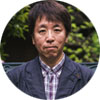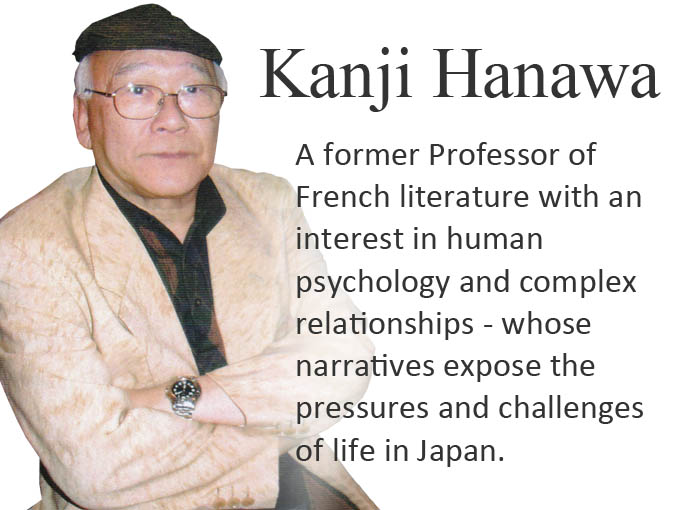 Students at Avonbourne College reading in their school library. Photograph: Avonbourne College
Students at Avonbourne College reading in their school library. Photograph: Avonbourne CollegeThe organisers of Broadening Horizons Through Literature aimed to introduce senior school-aged students to new authors, as “a way of encouraging them to step outside of their comfort zone, and really explore superb writing that they might not otherwise come across”.
 Avonbourne College school badge.
Avonbourne College school badge.The competition took place at Avonbourne College in Bournemouth, on the south coast of England, a single-sex all-girls school with over a thousand students.
The students selected one of the first three titles in the newly launched series Red Circle Minis; Stand-in Companion by Kazufumi Shiraishi, Backlight by Kanji Hanawa, and Tokyo Performance by Roger Pulvers to write about.
 Display of the first three books published in the series Red Circle Minis. Photograph: Red Circle Authors Limited
Display of the first three books published in the series Red Circle Minis. Photograph: Red Circle Authors Limited“Collaborating with Red Circle Authors Limited has enabled our young people to explore contemporary Japanese works. This has been a superb opportunity for them to expand their reading list and consider the wealth of literature that exists in other parts of the world. We are grateful to Red Circle for so generously supporting this initiative,” says Kathryn Loughnan, Director of Avonbourne College, who alongside Richard Warren, Head of the college’s English department, arranged the competition.
The winning essay by Liberty Bailey about the relationship between humans and technology as portrayed in Stand-in Companion by the Naoki Award-winning author Kazufumi Shiraishi is published below.
In her winning essay, Bailey writes: “we learn through a couple, Hayato and Yutori, troubled with infertility that technology may not always be the answer to a very human problem” and that by “presenting both characters as the victims allows Shiraishi to showcase the tainted view humans gain after a relationship ends bitterly”.
Bailey, who found the competition enlightening, commenting on her experience said, as her thoughtful essay clearly highlights, “Reading a wide range of literature allows us to explore different cultures, experiences and issues you may never understand otherwise”.
Humans and technology as portrayed in Kazufumi Shiraishi’s Stand-in Companion
by Liberty Bailey
 Liberty Bailey, the winner of the 2019 essay writing competition, Broadening Horizons Through Literature. Photograph: Avonbourne College.
Liberty Bailey, the winner of the 2019 essay writing competition, Broadening Horizons Through Literature. Photograph: Avonbourne College.At first Shiraishi presents the character of Hayato as vengeful and ridden with jealousy as he is left heartbroken after his 2 year marriage ends due to new laws that enforce “biological husband and wife relationship” to be together as Yutori falls pregnant, despite her infertility, with another man. His application to the “Human Rights Relief Committee” was originally because he “hated the idea of letting her get away with it”. The phrase ‘get away with it’ implies Yutori has actively engaged with a criminal activity, painting her as villainous to the reader but is later juxtaposed by her retelling of events as she claims Hayato cheats.
Presenting both characters as the victims allows Shiraishi to showcase the tainted view humans gain after a relationship ends bitterly and how it is only natural to avoid the wrong-doings we may have committed. Depicting Hayato as callous in nature after feelings of betrayal surface allows Shiraishi to examine the often cathartic experience of replacing our exes even if we aren’t over them.
The robot replacement of Yutori is therefore used as a tool to help Hayato let out his anger- reflecting how humans often use technology as a means for personal gain. When the “Stand-In Companion” version of Yutori goes to take a pregnancy test, Hayato “muses” as she “drops her shoulders in defeat”. The verb ‘muse’ shows Hayato absorbed in thought, potentially replaying the scene in his mind, and has connotations with amusement to the reader, further suggesting satisfaction at her failure.
Additionally this shows Hayato, but more so humans, need to feel revenge after an upset and may correlate to a 2009 Japanese game invention. ‘LovePlus’ allows users to gain a virtual girlfriend named Rinko who keeps them company, usually due to relationship breakdowns and loneliness. The company responsible has claimed that their gamers often describe it as a ‘cleansing and pleasurable experience’ that helps them navigate real world problems.
Whilst to Western readers this may seem unrelatable, as a collective we are relying more for our domestic needs on technology as the introduction of Amazon’s Alexa for example shows homeowners dependent on ‘her’ to fulfil tasks and provide entertainment with games. Modern day, man-made problems are frequently requiring modern day solutions which exist in the real world but Shiraishi explores it more thoroughly with the depiction of what we currently see as fantasy becoming reality.
However, both Hayato and Yutori are able to create loving, sympathetic relationships with their “Stand-In Companions” that could be compared to one similar between two humans, suggesting that humans and technology could form cohesive bonds. The very nature of the robots formal names (“Stand-In Companion”) suggests a formation of a close relationship as the noun ‘companion’ connotes care and even admiration for one another.
Despite the initial intended purpose to grieve and explore the reasons their last relationship dissolved, the author describes that “his attitude was beginning to grow” as Hayato’s continuing endurance of his robot’s disappointment with her infertility causes him upset when he had once “taken delight” in it. By describing Hayato’s attitude as ‘growing’, Shiraishi presents the sometimes unhealthy attachment formed in relationships, even with ones that aren’t necessarily real. The verb ‘grow’ may be a metaphor for humans’ ability to become better than they once were as due to circumstances our feelings change.
Hayato’s prolonged time spent with the Yutori replacement was once how he channelled his feelings of jealousy and “swift betrayal” but has now turned into ones of admiration as it “gradually becomes more painful” when the robot faces disappointment. Shiraishi exhibits to the reader humanity’s need for companionship in order to feel fulfilled, even if that has to be with someone who is not human.
This may explain a growing trend and fascination with ‘Sex Robots’ that began surfacing in 2018 (the same year Stand-In Companion was released) that could be available to the mainstream in a year few years. The predominantly female robots invented for sexual pleasure starting at £7,000 shows Shiraishi’s futuristic work to becoming more realistic in society today as the relationship between humans and technology shifts into a more romantic and sexual one, beginning to take place – perhaps even becoming normality.
Whilst the premise of the story shows the connection between technology and humanity, Shiraishi’s narrative highlights the true loneliness of being human as mundane events that we consider simplistic, are shared with metal rather than blood. Whilst Hayato is sat in the cafe with the android Yutori, Shiraishi divulges with the audience of what occurs when it is shut down and creates a sympathetic reading as the robot will be unable to “utter a single word,” or “ever open her eyes” and “will not answer”. The descriptive, a syndetic listing of the dramatic event allows for the reader to understand in depth the heart-breaking process as Hayato realises he is alone. It ironically gives the machine a quality of humanity as we see how vulnerable it is to the society it has been created in.
From Hayato’s imagination of this event Shiraishi presents him as incredibly reliant on the service in order to function as without it he would be left to deal with his imperfections alone as there is little mention of many other characters involved in his life other than his “lawyer friend Saeki” which could be argued as relatively fake as lawyers can be seen as untrustworthy. Whilst Shiraishi may have been restricted by his narrative choice of writing a novella, it still does not answer why the vast majority of Hayato’s interaction comes from a singular ‘being’.
Loneliness can also be depicted through Yutori’s experiences with a “Stand-In Companion” as whilst she is drinking coffee with her Hayato replacement she “wonders” what the owner thinks of “this couple who regularly visited here around this time once or twice a month” therefore presenting them as introverted. The adverb ‘regularly’ suggests a pattern has formed; an almost endless cycle taking place that is often found in everyday life we all experience.
Shiraishi may be playing into stereotypical viewpoints western readers especially may have of the Japanese as being antisocial due to ‘geeky’ depictions seen in literature and the media but again, the dual narration suggests a collective feeling of loneliness as humans get comfortable with the routines they create for themselves which is aided by technology.
Lastly, Shiraishi heavily portrays technology as a distraction and apparent ‘quick fix’ to problems in society that may in actuality require more consideration that humans do not want the responsibility for.
This is represented in the novella as the governing body is increasingly counting on technology, the ‘companions’ made, to be a method in which humanity can retain productivity despite the difficulties that may be manifest throughout our lives, such as infertility and heartache. Japan has more recently been synonymous with technological advancements alongside the rich and beautiful culture embedded within its history.
Therefore, the choice of setting of the futuristic tale ensures that it feels believable to the present audience as it seems that this technology and perhaps fertility issue would be prevalent in Asia due to the One Child Policy adopted in 1979 but later relaxed in 2013 by the Chinese Communist Party. The passing of the act has caused various fertility problems in modern day due to the imbalance ratio of men to women which Shiraishi may be drawing inspiration on as to why there are fertility problems in his futuristic society and therefore the need for the robotic service to exist.
We are told that the government started the programme “to promote the independence of people who have lost their beloved” and there is “no room for flexibility regarding the rental period” which allows the author to paint a more cold hearted world in a time where the issues present would demand human compassion (not technological replacements). The noun ‘flexibility’ ensures that if the bending of this rule was necessary it would not break suggesting a more empathetic viewpoint would cause damage to society’s functionality.
Shiraishi demonstrates to audiences that the engrossment with the introduction of materialism found with technology allows productivity levels to remain stable whilst the value of emotional capability is left behind.
Readers are also informed that the government issued a similar initiative for “Stand-In Mothers” when needed. This showcases that the programme introduced was successful enough to warrant an adaptation to further ‘help’ solve problems existing in society. Therefore, implying that humans often use materialism and engagement with technology as ways to fix the problems they face on the surface without wanting to go deeper and find the route cause that could end the issue.
In conclusion, the dynamic between technology and humans is represented as one-sided as humanity abuses what has been given as a coping mechanism. Whilst Hayato and Yutori are able to establish loving and compassionate bonds with their android devices, this is not through choice but rather circumstance and loneliness. Shiraishi portrays humans as thoroughly dependent on socialising in order to maintain focus and achievement even if it is manufactured. Yet he explores the difficulty this causes and ultimately comes to the conclusion grief and “jealousy caused by swift betrayal” does not have an AI solution.
 Signpost for Avonbourne College, a single-sex secondary school with academy status, located in Bournemouth, Dorset, the United Kingdom.
Signpost for Avonbourne College, a single-sex secondary school with academy status, located in Bournemouth, Dorset, the United Kingdom. About Red Circle:Red Circle Authors Limited is a specialist publishing and communications company that conducts bespoke projects on behalf of a carefully selected and curated group of leading Japanese authors. Red Circle showcases Japan’s best creative writing. For more information on Red Circle, Japanese literature, and Red Circle authors please visit: www.redcircleauthors.com.
About Red Circle:Red Circle Authors Limited is a specialist publishing and communications company that conducts bespoke projects on behalf of a carefully selected and curated group of leading Japanese authors. Red Circle showcases Japan’s best creative writing. For more information on Red Circle, Japanese literature, and Red Circle authors please visit: www.redcircleauthors.com.



